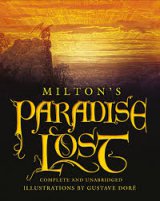Paradise Lost Page #2
Paradise Lost is an epic poem in blank verse by the 17th-century English poet John Milton. The first version, published in 1667, consisted of ten books with over ten thousand lines of verse. A second edition followed in 1674, arranged into twelve books with minor revisions throughout and a note on the versification.
Thus Satan talking to his neerest Mate With Head up-lift above the wave, and Eyes That sparkling blaz’d, his other Parts besides Prone on the Flood, extended long and large Lay floating many a rood, in bulk as huge As whom the Fables name of monstrous size, Titanian, or Earth-born, that warr’d on Jove, Briarios or Typhon, whom the Den By ancient Tarsus held, or that Sea-beast Leviathan, which God of all his works Created hugest that swim th’ Ocean stream: Him haply slumbring on the Norway foam The Pilot of some small night-founder’d Skiff, Deeming some Island, oft, as Sea-men tell, With fixed Anchor in his skaly rind Moors by his side under the Lee, while Night Invests the Sea, and wished Morn delayes: So stretcht out huge in length the Arch-fiend lay Chain’d on the burning Lake, nor ever thence Had ris’n or heav’d his head, but that the will And high permission of all-ruling Heaven Left him at large to his own dark designs, That with reiterated crimes he might Heap on himself damnation, while he sought Evil to others, and enrag’d might see How all his malice serv’d but to bring forth Infinite goodness, grace and mercy shewn On Man by him seduc’t, but on himself Treble confusion, wrath and vengeance pour’d. Forthwith upright he rears from off the Pool His mighty Stature; on each hand the flames Drivn backward slope their pointing spires, & rowld In billows, leave i’th’ midst a horrid Vale. Then with expanded wings he stears his flight Aloft, incumbent on the dusky Air That felt unusual weight, till on dry Land He lights, if it were Land that ever burn’d With solid, as the Lake with liquid fire; And such appear’d in hue, as when the force Of subterranean wind transports a Hill Torn from Pelorus, or the shatter’d side Of thundring Aetna, whose combustible And fewel’d entrals thence conceiving Fire, Sublim’d with Mineral fury, aid the Winds, And leave a singed bottom all involv’d With stench and smoak: Such resting found the sole Of unblest feet. Him followed his next Mate, Both glorying to have scap’t the Stygian flood As Gods, and by their own recover’d strength, Not by the sufferance of supernal Power. Is this the Region, this the Soil, the Clime, Said then the lost Arch Angel, this the seat That we must change for Heav’n, this mournful gloom For that celestial light? Be it so, since hee Who now is Sovran can dispose and bid What shall be right: fardest from him is best Whom reason hath equald, force hath made supream Above his equals. Farewel happy Fields Where Joy for ever dwells: Hail horrours, hail Infernal world, and thou profoundest Hell Receive thy new Possessor: One who brings A mind not to be chang’d by Place or Time. The mind is its own place, and in it self Can make a Heav’n of Hell, a Hell of Heav’n. What matter where, if I be still the same, And what I should be, all but less then hee Whom Thunder hath made greater? Here at least We shall be free; th’ Almighty hath not built Here for his envy, will not drive us hence: Here we may reign secure, and in my choyce To reign is worth ambition though in Hell: Better to reign in Hell, then serve in Heav’n. But wherefore let we then our faithful friends, Th’ associates and copartners of our loss Lye thus astonisht on th’ oblivious Pool, And call them not to share with us their part In this unhappy Mansion, or once more With rallied Arms to try what may be yet Regaind in Heav’n, or what more lost in Hell? So Satan spake, and him Beelzebub Thus answer’d. Leader of those Armies bright, Which but th’ Omnipotent none could have foyld, If once they hear that voyce, their liveliest pledge Of hope in fears and dangers, heard so oft In worst extreams, and on the perilous edge Of battel when it rag’d, in all assaults Their surest signal, they will soon resume New courage and revive, though now they lye Groveling and prostrate on yon Lake of Fire, As we erewhile, astounded and amaz’d, No wonder, fall’n such a pernicious highth. He scarce had ceas’t when the superiour Fiend Was moving toward the shore; his ponderous shield Ethereal temper, massy, large and round, Behind him cast; the broad circumference Hung on his shoulders like the Moon, whose Orb Through Optic Glass the Tuscan Artist views At Ev’ning from the top of Fesole, Or in Valdarno, to descry new Lands, Rivers or Mountains in her spotty Globe. His Spear, to equal which the tallest Pine Hewn on Norwegian hills, to be the Mast Of some great Ammiral, were but a wand, He walkt with to support uneasie steps Over the burning Marle, not like those steps On Heavens Azure, and the torrid Clime Smote on him sore besides, vaulted with Fire; Nathless he so endur’d, till on the Beach Of that inflamed Sea, he stood and call’d His Legions, Angel Forms, who lay intrans’t Thick as Autumnal Leaves that strow the Brooks In Vallombrosa, where th’ Etrurian shades High overarch’t imbowr; or scatterd sedge Afloat, when with fierce Winds Orion arm’d Hath vext the Red-Sea Coast, whose waves orethrew Busiris and his Memphian Chivalrie, VVhile with perfidious hatred they pursu’d The Sojourners of Goshen, who beheld From the safe shore their floating Carkases And broken Chariot Wheels, so thick bestrown Abject and lost lay these, covering the Flood, Under amazement of their hideous change. He call’d so loud, that all the hollow Deep Of Hell resounded. Princes, Potentates, Warriers, the Flowr of Heav’n, once yours, now lost, If such astonishment as this can sieze Eternal spirits; or have ye chos’n this place After the toyl of Battel to repose Your wearied vertue, for the ease you find To slumber here, as in the Vales of Heav’n? Or in this abject posture have ye sworn To adore the Conquerour? who now beholds Cherube and Seraph rowling in the Flood With scatter’d Arms and Ensigns, till anon His swift pursuers from Heav’n Gates discern Th’ advantage, and descending tread us down Thus drooping, or with linked Thunderbolts Transfix us to the bottom of this Gulfe. Awake, arise, or be for ever fall’n.
Translation
Translate and read this book in other languages:
Select another language:
- - Select -
- 简体中文 (Chinese - Simplified)
- 繁體中文 (Chinese - Traditional)
- Español (Spanish)
- Esperanto (Esperanto)
- 日本語 (Japanese)
- Português (Portuguese)
- Deutsch (German)
- العربية (Arabic)
- Français (French)
- Русский (Russian)
- ಕನ್ನಡ (Kannada)
- 한국어 (Korean)
- עברית (Hebrew)
- Gaeilge (Irish)
- Українська (Ukrainian)
- اردو (Urdu)
- Magyar (Hungarian)
- मानक हिन्दी (Hindi)
- Indonesia (Indonesian)
- Italiano (Italian)
- தமிழ் (Tamil)
- Türkçe (Turkish)
- తెలుగు (Telugu)
- ภาษาไทย (Thai)
- Tiếng Việt (Vietnamese)
- Čeština (Czech)
- Polski (Polish)
- Bahasa Indonesia (Indonesian)
- Românește (Romanian)
- Nederlands (Dutch)
- Ελληνικά (Greek)
- Latinum (Latin)
- Svenska (Swedish)
- Dansk (Danish)
- Suomi (Finnish)
- فارسی (Persian)
- ייִדיש (Yiddish)
- հայերեն (Armenian)
- Norsk (Norwegian)
- English (English)
Citation
Use the citation below to add this book to your bibliography:
Style:MLAChicagoAPA
"Paradise Lost Books." Literature.com. STANDS4 LLC, 2025. Web. 2 Jan. 2025. <https://www.literature.com/book/paradise_lost_101>.




Discuss this Paradise Lost book with the community:
Report Comment
We're doing our best to make sure our content is useful, accurate and safe.
If by any chance you spot an inappropriate comment while navigating through our website please use this form to let us know, and we'll take care of it shortly.
Attachment
You need to be logged in to favorite.
Log In